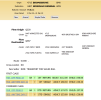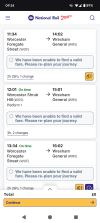Hi
@Watershed
So you are suggesting that TfW would view my travel being (and billed) as if I went south from Bromsgrove, changed at Hereford and then changed at Shrewsbury to give the fare that they are offering to get to Wrexham?
That's the way the fare has been priced, yes. As it turns out, the fare isn't actually valid that way, but as
@MrJeeves has explained, Bromsgrove to Wrexham fares are priced from a "cluster" of stations including Worcester, to another cluster including Wrexham. Worcester to Wrexham
is valid via Hereford so that is essentially what the fare is intended to cover.
So, and please excuse my ignorance here. Why is it cheaper to buy returns to Birmingham and then returns to Wrexham?
There appears to be absolutely no logic in this at all? I'd go so far as to say, its getting close to a criminal act that I shan't mention at this point.
The factors I listed above come into play. Arriva Trains Wales increased many of their fares by more than inflation during their tenure, so the TfW-set fare from Bromsgrove to Wrexham is quite expensive.
Bromsgrove is unfortunate in falling into the Worcester cluster rather than a Birmingham one, as is the case for Barnt Green for example (this is why splitting there or in Birmingham is much cheaper).
Fares from Bromsgrove to Birmingham are relatively cheap, reflecting the fact that they are (or were) subsidised by the local authority and that the service wasn't particularly attractive until the line was electrified and CrossCity services were extended there.
Whilst TfW also set Birmingham to Wrexham fares, they are constrained in how much they can charge because West Midlands Trains (whose predecessors increased fares less steeply) control the "Any Permitted" fares to Shrewsbury and Chester.
Are you sure? A quick search using the National Rail site does not offer an itinerary via Hereford. Searching for a "via Hereford" itinerary returns "no fares found".
As above, it's not actually valid that way but it is the way the fare is clearly priced.
I will of course go through Rail UK in future.
I mention a criminal act on the basis of being quoted a price (£74) which I can actually get for fourty-odd pounds. Isn't that some form of breach?
Unfortunately it isn't an offence of any sort. Variations and discrimination in pricing are common across all industries, and particularly the transport sector. Is it fair that flying from Dublin to New York via London is usually cheaper than starting in London? Not really, but that's just how it works.
I'm aware the rail industry is somewhat protected from the "Sales of Goods Act", but I would have thought that as train companies are obligated to act in the passenger's best interests, that they should, on their websites, be offering the best available fares?
The Sale of Goods Act has been replaced by the Consumer Rights Act for most consumer purposes. However it doesn't impose a duty on companies to act in the consumer's best interest. Such a duty only exists through external regulation in specific sectors, such as consumer finance.
It is also arguable what the "best available" fare even is. If you limit yourself to journeys that involve stopping at Barnt Green (which means only 1 train per hour from/to Bromsgrove) than you can get a much cheaper fare than if you limit yourself to journeys that involve travelling via Birmingham.
Similarly it might be the case that it's cheaper to buy a rover or ranger ticket for part of the journey. But working out whether this is cheapest can be very difficult as there are a lot of moving parts - are you returning the same day, when do you want to travel and so forth.
For example, shouldn't both TfW and WestMids say on their websites... if you buy a ticket to Brum and then on to Wrexham, you will save £25?
It'd be better if TfW changed the existing fare to be routed "via Hereford" and they (or WMT) created a cheaper "via Birmingham" fare. But I can't imagine that happening any time soon.
If this isn't the case, then that is a shocking show of how the rail industry is out of touch with the rest of society. At McDonalds, they will tell me the best deal. At a pub they will tell me the best deal. What makes the railway unique?
It's unique because it is a loss-making industry that has no real incentive to provide good customer service. The Treasury, whose subsidies keep it running, want to minimise their liability as much as possible and have therefore pursued policies which put as much of the burden as possible on passengers rather than taxpayers.


